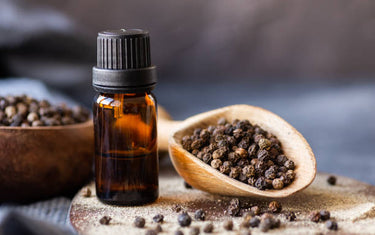8 min read / 21 March 2024 / yasmin sharp
8 Benefits and Uses of Black Pepper Oil
Explore the surprising health benefits and diverse uses of black pepper oil.

Black pepper is one of the most widely used spices in the world, a culinary essential that can make all the difference to the depth and flavour of almost any dish.
Its use stretches back thousands of years and whilst to many it is only to be used in the kitchen, the spice also has a long and proud medicinal history.
Many black pepper oil benefits remain unknown, although scientists around the world are hard at work attempting to unlock its health secrets.
Here we look at what we do know so far, including how it works, how it can benefit your mind and body and some popular black pepper oil uses.
What is black pepper oil?Black pepper essential oil, which is also known by its botanical name Piper Nigrum, is extracted from peppercorns that are formed on the flowering vine. It is native to southern India and has been extracted from the same areas for over 2000 years. Once the dried fruits of the vine are harvested, they are then steam distilled to produce a green or yellow essential oil that has a similarly strong aroma to crushed peppercorns. The oil is sometimes confused with the less common pink pepper, which is part of the same family, but has a distinctly different plant origin and scent. |
How does black pepper oil work?
One of the key components of black pepper oil is an alkaloid called piperine, which is responsible for giving black pepper its unique biting quality.
Whilst research is ongoing, studies have discovered that piperine contains several potential health benefits and pharmacological effects that could allow it to be used against a variety of conditions.
Black pepper essential oil is also a favourite with many people who choose to diffuse their oils, as the warm, spicy aroma helps to create a relaxing environment to combat stress and anxiety.
Topical application of black pepper oil can prove helpful in reducing sore and aching muscles and for reducing inflammation.
Massaging a diluted solution into the abdomen can also be effective at easing some IBS-related symptoms and similar conditions.

What are the benefits of black pepper oil?
Some of the best benefits of black pepper essential oil include its ability to:
1. Help with pain management
The warming effect produced by black pepper oil can be used to soothe aching muscles and similar injuries related to tendons or joints.
It also contains antispasmodic and anti-inflammatory properties which can help to calm pains and aches by relaxing muscles.
Researchers published this report after finding that black pepper oil performed well at treating neck pain, especially when applied topically. [1]
Any topical application of black pepper oil (as is true of all essential oils) should always be mixed with a carrier oil to safeguard the skin against irritation.
2. Improve digestion and calm IBS symptoms
Depending on the dosage, researchers have found that black pepper oil can produce both antispasmodic effects and spasmodic reactions.
This means the oil is able to relax tense muscles and spasms and reduce painful cramps and in other circumstances stimulate muscles into action.
Researchers learned that administering piperine to rats with IBS and severe symptoms of low mood helped to significantly improve both conditions. [2]
Abnormal brain-gut signalling may be caused by serotonin, which could explain why there is often such a strong link between the two conditions, making the piperine discovery particularly exciting.
3. Lower blood pressure and cholesterol
Heart disease is the leading cause of death worldwide and high blood cholesterol is believed to be one of the biggest contributors.
Black pepper oil benefits may also extend to the management of cholesterol.
Researchers conducting a rat study found that consuming black pepper saw a fall in fatty acid and cholesterol levels in the animals. [3]
An earlier study observed that the piperine in black pepper may contribute to the lowering of blood pressure. [4]
And because cholesterol and blood pressure are often closely linked, the oil could provide a simple home remedy as part of a wider dietary change.
4. Ease cigarette cravings
Quitting smoking can be tough, as it can affect people on a physical, psychological and emotional level.
But you may have an unexpected ally in black pepper essential oil, which scientists believe could help to calm cravings and ease anxiety.
This is based on a clinical study that found inhaling black pepper oil was able to suppress cigarette cravings, whilst also helping to control other withdrawal symptoms. [5]
Compared to the controlled group, the people involved in the experimental group had fewer negative symptoms and lower anxiety, demonstrating that black pepper oil was able to address most aspects of the condition.

5. Improve blood sugar control
Another one of the surprising benefits of black pepper oil is its potential to act as a blood sugar control agent.
One study found that when black pepper extract was fed to rats after consuming glucose, they experienced a lower blood sugar spike compared to rats in a control group. [6]
A human study involving 85 overweight people taking a supplement that contained piperine and other compounds saw a positive change in insulin insensitivity after 8 weeks. [7]
However, it is yet to be determined how effective black pepper alone could be, as additional active plant compounds played a role in producing these results.
6. Potentially improve brain function
Early-stage animal studies have suggested that piperine could improve brain function, with initial results indicating it could be used to combat Alzheimer’s and Parkinson’s disease.
For example, a study published in 2014 found that memory could be improved in rats with Alzheimer’s. [8]
Researchers observed the rodents that had received piperine repeatedly navigate through a maze with more efficiency compared to another group that did not use the compound.
Another study revealed that piperine extract could decrease the presence of amyloid plaques. [9]
These are protein fragments that gather in damaging clumps in the brain and have a long-standing association with Alzheimer’s.
7. Boost antioxidant protection
Exposure to cigarette smoke, pollution, UV rays and other environmental factors can lead to the excessive use of free radicals, which can cause significant damage to body cells and lead to significant health problems.
Rodent and test tube studies have suggested that piperine and ground black pepper supplements may be able to lower damage caused by free radicals. [10]
For example, when rats with a high-fat diet were given either concentrated black pepper extract or black pepper, after 10 weeks researchers observed far fewer markers of free radical damage compared to rats that were not given the treatment. [11]
8. Exhibit anticancer activity
There are theories that piperine may contain cancer-fighting properties, although no human trials have been conducted to date. [12]
When researchers conducted test-tube studies, they observed that the replication of colon, prostate and breast cancer cells could be slowed by piperine, whilst also inducing cancer cell death. [13]
A separate laboratory study also showed that piperine could have a positive effect on multidrug resistance in cancer cells. [14]
This could potentially help to combat an issue that affects the efficacy of certain chemotherapy treatments.

How do you use black pepper oil?
The many uses of black pepper oil allow it to be easy applied as:
A massage oil
When diluted and applied topically, black pepper oil benefits muscles and joints by warming the area to provide relief and ease discomfort.
Some people also use this technique on the abdomen to reduce painful cramping caused by IBS or similar conditions.
An aromatherapy agent
Another great way to enjoy black pepper essential oil is through diffusion.
The warm and spicy aroma of the oil can create a relaxing atmosphere that supports your mental health so you can manage moments of stress and anxiety to find a sense of calm.
What is the history of black pepper oil?
Ancient Romans used black pepper spice as a currency due to how highly valued it was at the time, whilst the Greeks displayed ownership as a sign of wealth and power.
During the Middle Ages in Europe, black pepper was used to preserve meats and to overpower unwanted odours and remained a central part of the spice trade for centuries.
Where Greek physician Hippocrates (often called the Father of Medicine) once doubted the medicinal value of black pepper, recent discoveries have confirmed its health-boosting potential.
For example, it was discovered that the skin condition vitiligo could be treated thanks to black pepper’s pigment production-boosting effects. [15]
As we discussed earlier in the article, research into the natural properties of black pepper is ongoing, with many studies already making some important breakthroughs.

Black pepper oil FAQs
What are the risks of using black pepper essential oil?
When using black pepper essential oil on your skin you should always ensure it is diluted correctly.
First-time users should complete a patch test to ensure it is compatible with their skin.
Never ingest black pepper essential oil – or any other essential oil – as it can be toxic.
What does black pepper essential oil smell like?
Black pepper essential oil smells very similar to freshly crushed peppercorns, although the aroma is slightly more complex with hints of floral and green.
And, unlike ground peppercorns, one of the benefits of black pepper oil is that you can inhale without having to sneeze or deal with eye irritation.
Can black pepper oil help to reduce appetite?
One small study involving 16 adults found that compared to drinking flavoured water, drinking a black pepper-based beverage saw a reduction in their appetite. [16]
However, this effect was not seen in other studies, so more research is needed in this area.
[1] Ming-Chiu Ou et al. (2014) The effectiveness of essential oils for patients with neck pain: a randomized controlled study https://pubmed.ncbi.nlm.nih.gov/25192562/
[2] Shu-Juan Wu et al. (2013) Effect of piperine on 5-HT and synaptophysin expression of rats with irritable bowel syndrome https://pubmed.ncbi.nlm.nih.gov/24689235/
[3] Hannah R Vasanthi et al. (2010) Indian Spices for Healthy Heart - An Overview https://www.ncbi.nlm.nih.gov/pmc/articles/PMC3083808/
[4] Syed Intasar Husain Taqvi et al. (2008) Blood pressure lowering and vasomodulator effects of piperine https://pubmed.ncbi.nlm.nih.gov/19033825/
[5] J E Rose et al. (1994) Inhalation of vapor from black pepper extract reduces smoking withdrawal symptoms https://pubmed.ncbi.nlm.nih.gov/8033760/
[6] Ayumi Maeda et al. (2018) Piperine Promotes Glucose Uptake through ROS-Dependent Activation of the CAMKK/AMPK Signaling Pathway in Skeletal Muscle https://pubmed.ncbi.nlm.nih.gov/29683271/
[7] Mariangela Rondanelli et al. (2013) Improvement in insulin resistance and favourable changes in plasma inflammatory adipokines after weight loss associated with two months' consumption of a combination of bioactive food ingredients in overweight subjects https://pubmed.ncbi.nlm.nih.gov/23271695/
[8] Lucian Hritcu et al. (2014) Methanolic extract of Piper nigrum fruits improves memory impairment by decreasing brain oxidative stress in amyloid beta(1-42) rat model of Alzheimer's disease https://pubmed.ncbi.nlm.nih.gov/24442916/
[9] Lokraj Subedee et al. (2015) Preventive role of Indian black pepper in animal models of Alzheimer's disease https://www.ncbi.nlm.nih.gov/pubmed/26023568
[10] K Srinivasan (2014) Antioxidant potential of spices and their active constituents https://pubmed.ncbi.nlm.nih.gov/24188307/
[11] R S Vijayakumar et al. (2004) Antioxidant efficacy of black pepper (Piper nigrum L.) and piperine in rats with high fat diet induced oxidative stress https://pubmed.ncbi.nlm.nih.gov/15231065/
[12] Jie Zheng et al. (2016) Spices for Prevention and Treatment of Cancers https://pubmed.ncbi.nlm.nih.gov/27529277/
[13] Y Ba et al. (2018) Potential of piperine in modulation of voltage-gated K+ current and its influences on cell cycle arrest and apoptosis in human prostate cancer cells https://pubmed.ncbi.nlm.nih.gov/30575945/
[14] Azadeh Manayi et al. (2018) Piperine as a Potential Anti-cancer Agent: A Review on Preclinical Studies https://pubmed.ncbi.nlm.nih.gov/28545378/
[15] Oregon Health & Science University (2008) Pepper Compound Could Aid Millions With Vitiligo https://www.sciencedaily.com/releases/2008/04/080413172937.htm
[16] Yoghatama Cindya Zanzer et al. (2018) Black pepper-based beverage induced appetite-suppressing effects without altering postprandial glycaemia, gut and thyroid hormones or gastrointestinal well-being: a randomized crossover study in healthy subjects https://pubmed.ncbi.nlm.nih.gov/29691526/









